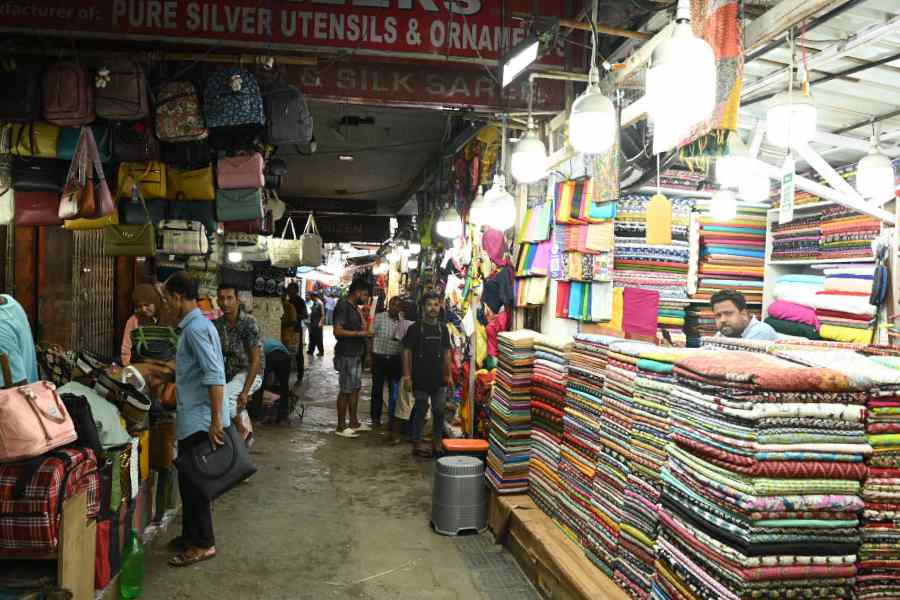Traders in and around New Market are struggling for survival in the run-up to Ramazan, supposed to be the best time for business, because Bangladeshi customers have still not returned in big numbers.
Some traders have already been put out of business. Many who haven’t are unsure how long they can hold on.
Since the turmoil started in the neighbouring country in July 2024 and led to the ouster of the Sheikh Hasina government in August, tourist visas are still not issued like before by the Indian high commission in Bangladesh, said sources. Only a few medical visas are being granted to Bangladeshis. The curbs on tourist visas have dented business across the border.
The lobby of Gulshan Palace, a budget hotel on Mirza Ghalib Street (popularly called Free School Street), was empty when Metro visited on Thursday afternoon. A receptionist was hooked to her mobile screen and the owner, R.K. Tara, was signing vendor bills at her desk.
“I don’t know how to keep going,” she said. The hotel has 13 rooms. This time of the year, none would be empty for even a single day in the month. On Thursday, only four rooms had guests, none of them from Bangladesh. “This is how it has been for months. Not even half the rooms are booked,” said Tara.
A non-AC room at the hotel, which would earlier cost around ₹1,100 per day, is now ₹600. An AC room now costs ₹1,200, compared to the usual price of ₹2,000 per day.
“What else can we do? There are overhead expenses that have to be borne, no matter what. I have to pay electricity bills, taxes and staff salary,” she said.
Shringaar, a store selling salwar suits in New Market, had four people inside. All of them were employees of the store. “Business is down 75 per cent,” the manager said.
“The days leading to Ramazan would see mad rush earlier. The store would be full of customers. Seven in 10 buyers would be from Bangladesh,” he said.
Shamsi Fashion, on Marquis Street, which sold saris and suits, has shut shop.
“I had to pay a monthly rent of ₹2.5 lakh. Other overhead expenses ran up to another ₹2.5 lakh. How long can I keep spending ₹5 lakh every month when business has nosedived?” asked Kamruddin Mallick, the owner of the shop.
Marquis Street, Free School Street, Kyd Street, Sudder Street, Rafi Ahmed Kidwai Road and neighbouring areas of New Market would buzz with visitors from Bangladesh.
Stores that sell saris, sherwanis and salwar suits; eateries that dish out delectable Bengali dishes; hotels, guest houses, travel agents, tour operators, currency changers and even street vendors who sell accessories — all depend on Bangladeshi patrons.
The deserted roads and empty stores now paint a gloomy picture of the once-bustling trade hub.
“Several hoteliers who had taken properties on lease have surrendered them because they could no longer continue paying rent. More will go out of business if the situation does not improve,” said Hyder Ali Khan, general secretary, Free School Street Traders Association.
Chayan Saha, owner of Prince, a popular eatery on Free School Street, said he had curtailed “drastically” the procurement of raw ingredients. “Eighty per cent of my customers used to be Bangladeshis. Now, they are gone,” he said.
Azizur Rahman Khan and wife Sonia had just finished lunch at the restaurant when this Metro visited.
Azizur is on a medical visa from Bangladesh. He suffers from acute diabetes and has come for treatment at a private hospital on Theatre Road. “We got visas after a long wait of more than three months.”
He came on a bus from Dhaka and will go back this Sunday. “The bus had 45 seats but only 25-odd passengers,” he said.
Shyamal Saha, a currency exchanger on Marquis Street, has barely been dealing in $300 per day, compared to $5,000 this time last year.
“Unless tourist visas are issued again, the situation is not going to improve,” Saha said.










